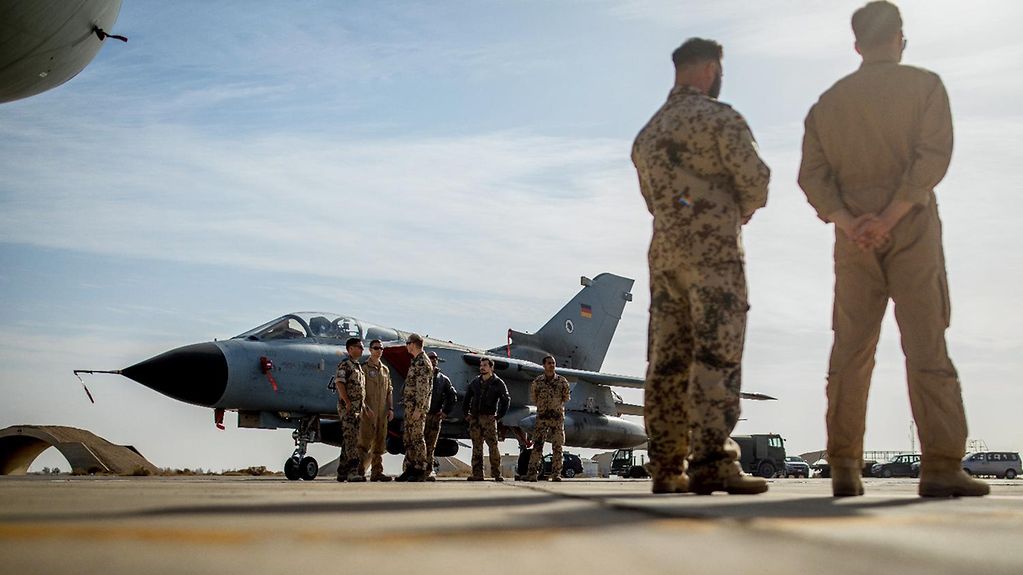Situation in Iraq
Tensions in the Gulf region are jeopardising the stability and the unity of Iraq and threatening to undermine the fight against the Islamic State (IS). No German troops were injured in the Iranian missile attacks on military facilities in Iraq. The German government calls on all sides to end the upward spiral of violence.
3 min reading time

The Bundeswehr is involved in the fight against the Islamic State (IS)
Photo: picture alliance / Michael Kappeler
In a statement issued jointly with the French President Emmanuel Macron and the British Prime Minister Boris Johnson on 5 January 2020, Chancellor Angela Merkel condemned Iran’s attack on coalition forces in Iraq. The three leaders called for restraint on all sides and de-escalation. They also urged Iran to reverse all measures inconsistent with the Joint Comprehensive Plan of Action (JCPOA), or nuclear deal, and to return to the negotiating table.
Training mission to be continued
The German government agrees with all members of the international anti-ISIS coalition that there is an urgent need to uphold the training mission in Iraq, in order to enable Iraqi forces to fight terrorism in the country. "We want to continue the training mission, because IS has not yet been beaten," declared Federal Defence Minister Annegret Kramp-Karrenbauer.
German troops can be withdrawn at very short notice
Until it is clear whether or not foreign forces will have to leave the country, German troops will remain in Iraq. Only those whose tour of duty in Iraq had ended have now returned to Germany.
Since there has been no further escalation, the Bundeswehr believes it is acceptable to leave the German troops on the ground. The Inspector General of the Bundeswehr stated, "Should the situation deteriorate, troops can be pulled out at very short notice."
In a resolution, Iraq’s Parliament has called on the government in Baghdad to expel all foreign troops. It is still unclear whether or not the Iraqi government will act on this. In a telephone conversation with Federal Defence Minister Annegret Kramp-Karrenbauer, her counterpart in Baghdad indicated that Iraq is still very much interested in continuing the training mission.
American drone attack – Iran’s reaction
On 3 January 2020 a US drone attack killed the Iranian General Qasem Soleimani. In the early hours of 8 January, Iran then launched a missile attack on US military facilities in Erbil, in northern Iraq and Ain al-Assad in the west of the country. There were no casualties among the troops stationed at the bases, who had taken shelter in bunkers. The missiles targeting Erbil landed a few kilometres away from the air base and caused no damage.
Impacts on European security
Federal Minister for Foreign Affairs Heiko Maas made it clear that conflict in the Middle East impacts directly on European security interests. "The last thing we all need is for things to flare up on a wide scale in the Middle East. That would seriously change security in Europe, and not for the better," warned Heiko Maas. For this reason EU foreign affairs ministers will meet on Friday, under the aegis of the EU’s High Representative for Foreign Affairs and Security Policy Josep Borrell, to discuss the situation in Iraq.
Focus on protecting troops
Currently a total of 26 Bundeswehr soldiers have returned from Iraq to Germany at the end of their tour of duty as planned. All other troops will remain in Erbil for the time being. Most of the troops are responsible for the operations of the camp on the ground, but the soldiers responsible for training Iraq’s security forces will also remain in Iraq.
Protecting German soldiers remains the priority. Following Iran’s missile attack, some 30 German soldiers stationed in and around Baghdad were temporarily deployed to Jordan and Kuwait.